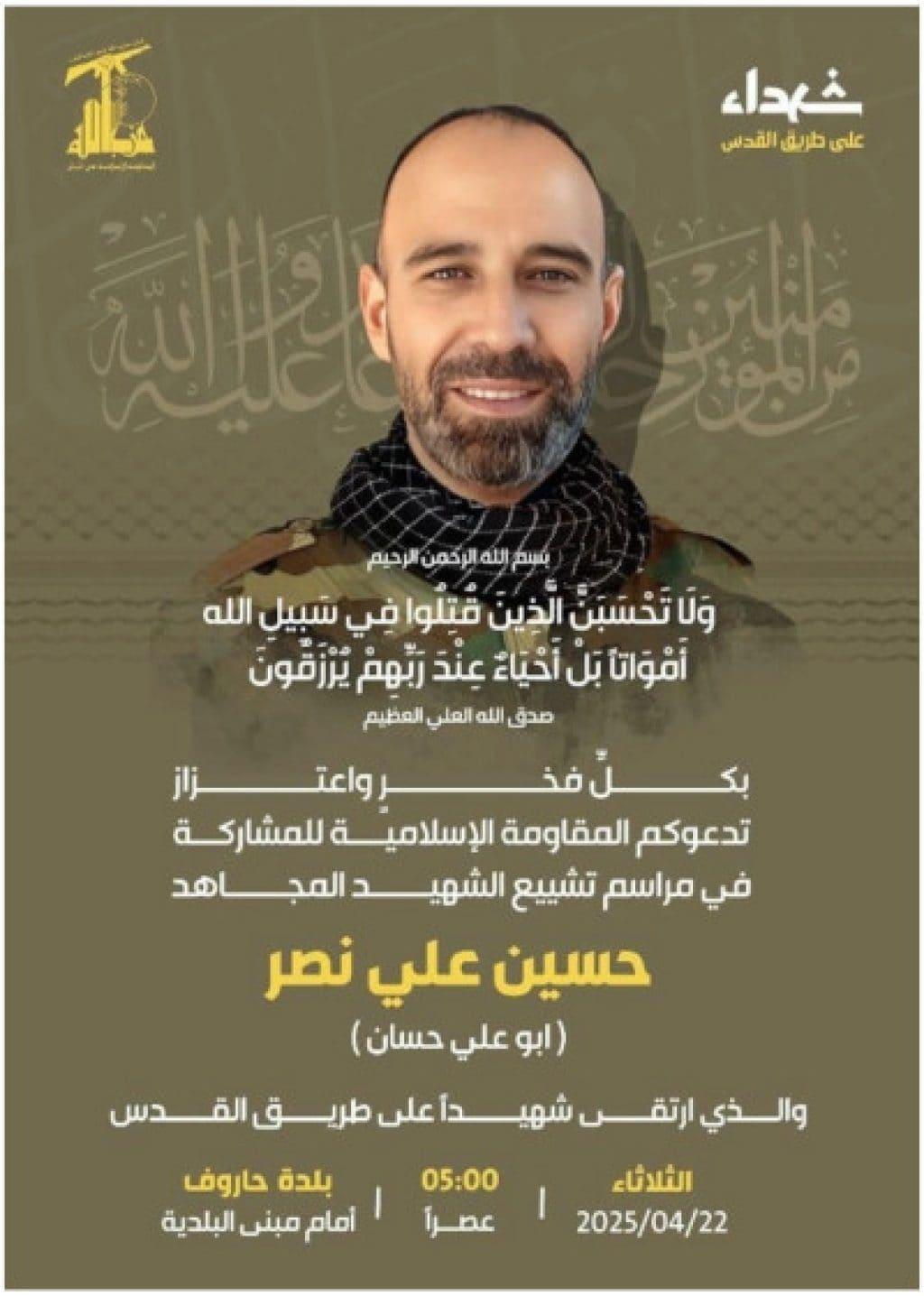
Israel kills Hezbollah Unit 4400 deputy commander
Israel continued its targeted killings of Hezbollah operatives and commanders this week, assassinating a senior commander of the group’s Unit 4400 on Sunday. Unit 4400 is Hezbollah’s body responsible for smuggling weapons to the group from Iran.
At 12:27 pm, Lebanon’s National News Agency reported that an Israeli drone targeted a vehicle on the village of Kawthariyat Al Saiyad’s eastern road in the South Lebanon Governorate’s Saida District. Initial reports indicated the strike killed one person and wounded two others.
Four hours later, the Israel Defense Forces (IDF) released a statement on the strike, revealing that it had targeted and killed Hussain Ali Nasr, whose nom de guerrewas Abu Ali Hassan, Unit 4400’s deputy commander. The IDF’s statement noted that Israel had targeted and killed Unit 4400’s former commander, Mohammad Jaafar Qasir, on October 1 and his deputy, Ali Hassan Gharib, on October 24, in an airstrike targeting a vehicle in the Mezzeh neighborhood of Damascus. This statement suggests Nasr was Gharib’s replacement, and Qasir has also likely been replaced.
The IDF said that as part of Nasr’s duties, he “broadly oversaw Hezbollah’s armament activities.” More significantly, the IDF said Nasr “smuggled weapons, materiel, and funds into Lebanon to help Hezbollah rebuild its military capabilities.” The statement’s language suggests that Nasr’s activities were ongoing and continued after the Israel-Lebanon ceasefire on November 27, 2024, despite the agreement’s terms. The IDF also alleged that Nasr advanced and oversaw deals to purchase weapons for Hezbollah from smugglers on the Syria-Lebanon border.
As part of these duties, the IDF also claimed that Nasr, “alongside Iranian officials […] advanced the transfer of weapons and funds to Lebanon, including through Beirut International Airport.” The IDF alleged Nasr was “in contact with employees at the airport who secretly worked for Hezbollah and facilitated the smuggling.”
An April 6 Asharq al Awsat report quoted an anonymous “informed source” who alleged that Beirut’s airport authorities canceled the licenses of over 30 Hezbollah-linked employees who carried travelers’ luggage, transferred luggage onto planes, inspected bags, and worked in the lost items section. The source said that these dismissed employees had enjoyed total freedom of movement at the airport, acted as Hezbollah’s source of intelligence on travelers, and were employed under pressure from the group.
Lebanon’s Public Works Ministry told L’Orient-Le Jour that the information in Asharq al Awsat’s report was “not factual.” However, two anonymous employees also told the publication that layoffs and revocations of licenses, particularly among baggage handlers, had occurred, and “at least some of those targeted are linked to Hezbollah.” One source said these events occurred after Fadi Al Hassan, the interim head of Beirut–Rafic Hariri International Airport who is allegedly close to Hezbollah, was fired on March 13. However, the source also said they consider the firings “normal,” given the “changes occurring in the country following the formation of [Lebanese Prime Minister] Nawaf Salam’s government.”
The second source also insisted Asharq al Awsat’s report was accurate but noted that the individuals who lost their licenses were “not [airport] employees,” nor did they work for a “tourism or travel company.”
“These [dismissed] people were given authorizations to enter the airport to meet travelers or to see them off,” the source explained, stating that they “can no longer do so.” The source also alleged that a Hezbollah-linked employee who worked in Hassan’s office also had their access authorization to the airport revoked.







You must be logged in to post a comment.